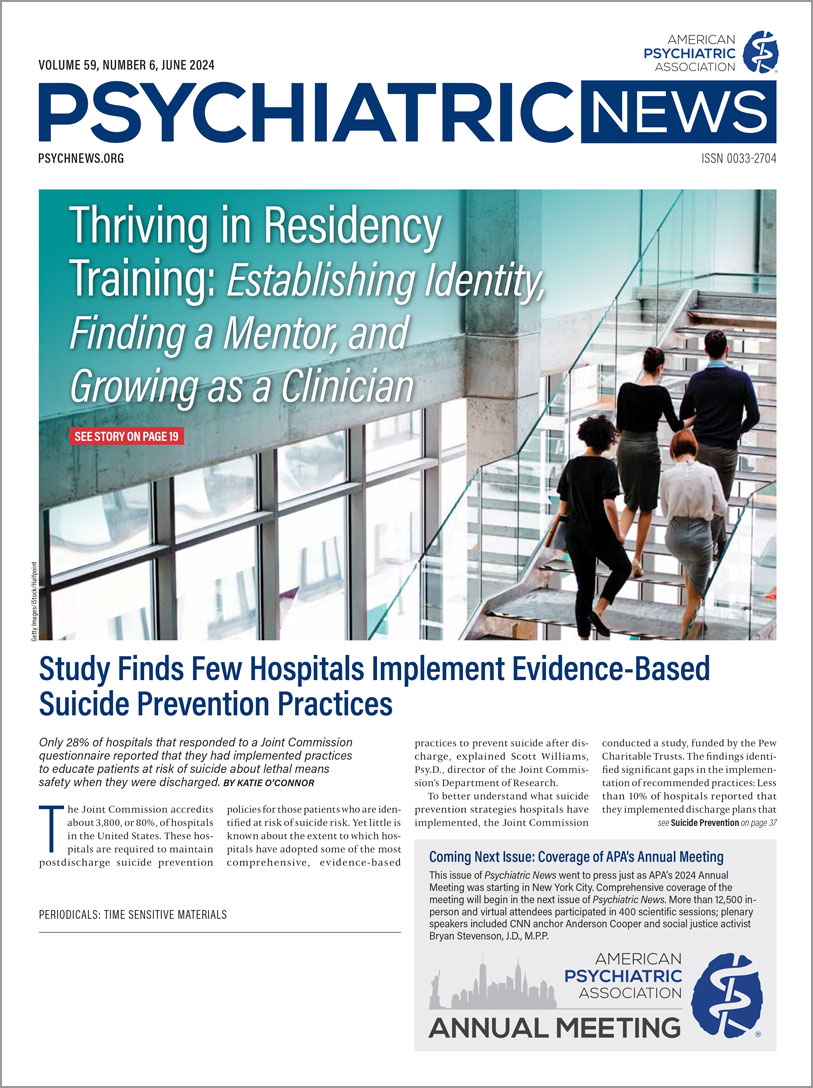Are Your Patients Using ‘Digital Supplements’?
Is it time to add a new question to the clinical interview?
As smartphones and apps become more and more popular, patients are increasingly finding themselves able to download and use smartphone apps that claim to help their mental health care.

Facebook ads for new anxiety-reducing apps, Google search ads for new computer-based psychotherapy apps, and mobile app stores’ thousands of mental health apps overwhelm both novices and experts alike. What if patients choose the wrong app? Or—even worse—the doctor?
Before considering how patients are using these apps, it is necessary to discuss what we know about these apps. Review papers on depression, bipolar disorder, suicide prevention, and mindfulness apps have all shown that currently available apps are largely lacking in quality, and some even offer harmful recommendations. Recent research has also raised concerns that numerous health apps do not offer appropriate safeguards for sensitive patient data. For instance, researchers at Ecole Polytechnique CNRS and the Global eHealth Unit at the Imperial College London have shown that 50 percent of the applications evaluated within the United Kingdom’s National Health Service apps directory transmitted strong patient identifiers, and two-thirds of these sent them without encryption. Many app developers may be selling patient data for profit.
But there is also encouraging evidence that some apps can be helpful to patients. These apps may be useful as an adjunct to current clinical practices. Although many studies have been performed on Internet interventions and computer-based support services, app studies are only just beginning to be published. Given the nascent state of the literature and evidence base for apps in psychiatry—plus the lack of guidelines and standards for using apps in clinical care—“app prescribing” may be fraught with risks for both patients and doctors.
In this complex and evolving landscape of mental health apps, how are patients using these apps?
The number of apps available is always changing, but industry reports suggest that mental health apps are the single largest category of health apps available—more than cardiology, endocrine, or even cancer apps. But we do not have data on exactly how many patients are using these apps as part of their treatment. The situation in many ways is analogous to the dietary supplement industry. We know that some dietary supplements may be helpful to patients and that others can be dangerous and even contraindicated and cause adverse drug reactions. Thus, during the clinical exam, psychiatrists often inquire whether patients are taking any supplements and, if so, inquire further to learn how supplement use may be impacting care.
Considering smartphone apps as “digital supplements,” it may be useful to also ask patients if they are using any smartphone apps or digital tools. Given the increasingly high rates of smartphone ownership and interest in apps from patients, psychiatrists may be surprised to learn what some of their patients may be using. We recommend questions such as the following:
Do you use a smartphone?
Are you willing to use a smartphone to manage your health?
How do you look up health information on your smartphone?
What apps do you use for health and fitness?
How do you choose which apps to use?
Psychiatrists can then help patients evaluate whether a certain app appears useful or safe or—at worst—may be dangerous and offer concerning advice. There are no standards to help guide decision making about the utility of smartphone apps, but a potentially useful framework was presented at APA’s 2016 IPS: The Mental Health Services Conference for exploring app evaluation in psychiatry.
The ASPECT framework suggests that patients and psychiatrists can evaluate apps by considering whether the app is Actionable, Secure, Professional, Evidence Based, Customizable, and Transparent (ASPECT).
Actionable: Does the app collect data that will help the patient or psychiatrist make more informed decisions about care or provide adjunctive recommendations that will impact patient care?
Secure: Does the app protect patient information? Does it meet state and federal privacy regulations as applicable?
Professional: Does the app meet ethical and professional standards for use in clinical care?
Evidence Based: Is there some evidence that suggests the app may be helpful and not harmful?
Customizable: Can the app be used in a manner that fits the unique goals set by the patient and psychiatrist? Does the app allow the user to make the app most useful to his/her own needs?
Transparent: Is the app transparent in how patient data are used? Do patients control their own data and how are they used?
The ASPECT framework is not meant to be exhaustive and will not be perfectly suited to help with decision making around every app. But it does offer a starting point to ensure that important domains of app evaluation are at least considered.
As psychiatry continues to study apps—and clinical studies yield more results—it will be possible to evaluate apps with more certainty. Until then, psychiatrists should find it useful to assess patients’ technology literacy—much as they do when assessing social and economic factors—and then consider a discussion on the ASPECTS of app use. ■



